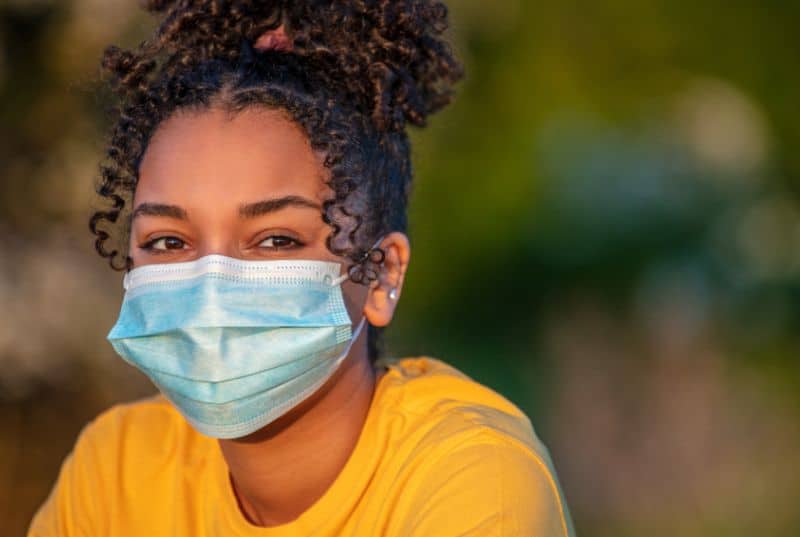
What is ‘Maskne’?
What is Maskne and how can I help my skin?
This year the world has seen a change, not only have we endured lockdowns, business closures and social distancing. But we are now becoming accustomed to the daily usage and wearing of masks/face coverings. Masks and PPE have been, and still are, an essential tool in helping to prevent the spread of Covid-19.
But what exactly is Maskne?
The medical term for maskne is ‘acne mechanica’, a skin condition that is brought on by the prolonged wearing of facial personal protective equipment, or as we’ve all come to know it, PPE, face coverings and masks.
The thing is, acne mechanica isn’t new; healthcare workers and medical professionals who have worn masks before the Covid-19 pandemic have been able to relate to this problem for some time. It’s just that Covid-19 has led to the general public wearing and using masks on a daily basis, that the condition has made become more widespread and led to the term ‘maskne’. These types of skin breakouts are easily identifiable because they only occur in the areas of the face that is protected or covered by a face covering or mask (usually the chin, nose and mouth areas).
The acne caused by masks is different to regular acne, as that is caused by hormonal changes. ‘Maskne’ is a direct result of a physical disruption of the skin; the consistent rubbing of material against your skin can result in micro-tears, which can then lead to bacteria, dirt and oil easily entering underneath the surface and clogging up your pores. Face masks have been designed and utilised in order to limit the airflow from entering/exiting, which means the skin cells that you would usually be shedding throughout the day are trapped on the surface and have nowhere to go.
However, it’s important to remember that face coverings play a vital role in the fight against COVID-19. But the humid and sticky environment a mask creates around your face, chin and nose can cause breakouts for two main reasons: ·
Physical rubbing – if you’re wearing a mask for long periods of time, the excess heat and pressure of the material against your face can cause a breakdown in the protective layer of your skin. This layer helps keep out external aggressors and works to keep your skin hydrated. Without this layer, your skin may be more prone to pimples referred to as ‘acne mechanica’/maskne. ·
Trapped moisture – this can happen especially in summer, the combination of sweat and oil that gathers under the mask (not to mention trapped breath) can clog pores. The lack of air circulation encourages bacteria growth and can lead to blackheads, whiteheads or pimples that will vary in size depending on how infected they become.
What does maskne look like?
If you’re seeing increased breakouts around the bottom half of your face then you could have maskne. Maskne causes visible spots, redness, blemishes and breakouts directly where your mask comes into contact with your skin.
How can I prevent maskne?
There are ways in which you can help prevent maskne from happening before you do go out to seek any form of treatment.
1. Wash your mask (if reusable): washing between each wear prevents bacteria from building up, washing can be done by hand or by machine.
2. Wash your face: it’s good practice to ensure good facial hygiene, try gently cleansing your face – especially in the areas where your mask sits. Use gentle scrubs and don’t be too harsh, harder scrubbing can damage the skin further.
3. Face mask size: ensure your mask covers your nose and mouth without being too tight/loose, this can cause unnecessary friction.
4. Mask material: if you already have acne prone skin, softer material such as silk or cotton are preferred over synthetic materials which can be harsher on the skin.
5. Skincare routine: follow a skincare routine and; avoid wearing heavy make-up that may clog your pores.
How to treat maskne?
It’s important to note that even people without pre-existing skin conditions will suffer at the hands of maskne, the hot and sweaty environment created by a mask around the nose and mouth can cause flare-ups in anyone. However, those with existing conditions may find it harder to control the breakouts. ·
Topical skincare products: Try our Voila Pure Advanced Vitamin C 50 Serum (with hyaluronic acid & vitamin E)
Acne or breakouts: having a regular skincare routine will lessen mask related skin irritation, however, if breakouts, redness or swelling still persist, seek medical care with your GP or skincare specialist.

